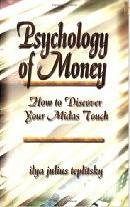 Dough, wonga, greenbacks, cash. Just words, you might say, but they carry an eerie psychological force. Chew them over for a few moments, and you will become a different person. Simply thinking about words associated with money seems to makes us more self-reliant and less inclined to help others. And it gets weirder: just handling cash can take the sting out of social rejection and even diminish physical pain.
Dough, wonga, greenbacks, cash. Just words, you might say, but they carry an eerie psychological force. Chew them over for a few moments, and you will become a different person. Simply thinking about words associated with money seems to makes us more self-reliant and less inclined to help others. And it gets weirder: just handling cash can take the sting out of social rejection and even diminish physical pain.
This is all the stranger when you consider what money is supposed to be. For economists, it is nothing more than a tool of exchange that makes economic life more efficient. Just as an axe allows us to chop down trees, money allows us to have markets that, traditional economists tell us, dispassionately set the price of anything from a loaf of bread to a painting by Picasso. Yet money stirs up more passion, stress and envy than any axe or hammer ever could. We just can’t seem to deal with it rationally… but why?
Our relationship with money has many facets. Some people seem addicted to accumulating it, while others can’t help maxing out their credit cards and find it impossible to save for a rainy day. As we come to understand more about money’s effect on us, it is emerging that some people’s brains can react to it as they would to a drug, while to others it is like a friend. Some studies even suggest that the desire for money gets cross-wired with our appetite for food. And, of course, because having a pile of money means that you can buy more things, it is virtually synonymous with status – so much so that losing it can lead to depression and even suicide. In these cash-strapped times, perhaps an insight into the psychology of money can improve the way we deal with it.
March 20, 2009



